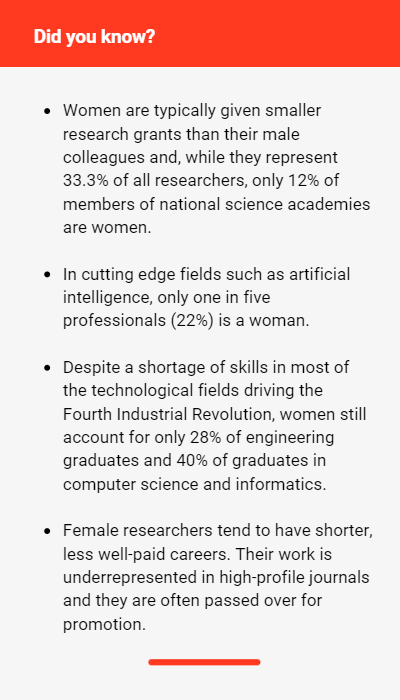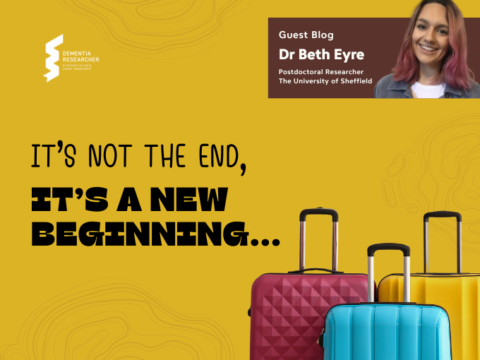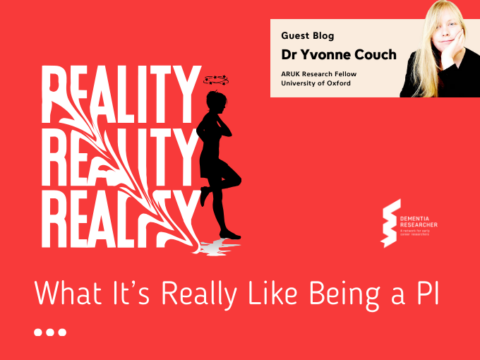Happy International Day of Women and Girls in Science! This day annually marks the resolution set by the United Nations in 2015 to celebrate women and girls in science and raises awareness of the gender gap in the field of Science and Technology. The gender gap in science still holds women back. According to UNESCO’s Science Report, only 1/3 of science-based researchers are female. While >70% of health and social care workers are women, they are paid ~11% less than their male counterparts. But the world needs science, and science needs women and girls! And what better way to honour this day than reflecting on some of the ground-breaking contributions made to the field by female scientists…
Katherine Johnson made history as one of the first black women to work as a NASA scientist. In 1961, Johnson’s calculations put the first U.S astronaut in space, Alan B. Shephard. Her work included calculating trajectories, launch windows and emergency return paths for various projects such as a mission to Mars and Project Mercury. She was known as the “human computer” for her incredible mathematical capabilities. For over 30 years, she used her mathematical capabilities to transform the possibilities of space travel, and without her super brain – the race to space would not have been possible. What an absolute genius!
 And we all know it wouldn’t be International Day of Women and Girls in Science without highlighting the work of Marie Curie, the first woman to win a Nobel Prize, the first person to win the Nobel Prize twice, and the only person to win the Nobel Prize in two scientific fields… that’s a lot of prizes! But it’s no wonder why. She discovered the elements: polonium and radium, thereby pioneering the use of radiation in medicine, and changed the entire world’s understanding of radioactivity. In fact, she even coined the term “radioactivity” in the findings of her seminal paper first published in 1898. When World War 1 broke out in 1914, she suspended her research and organized a fleet of mobile X-ray machines for doctors on the front – a truly inspirational person!
And we all know it wouldn’t be International Day of Women and Girls in Science without highlighting the work of Marie Curie, the first woman to win a Nobel Prize, the first person to win the Nobel Prize twice, and the only person to win the Nobel Prize in two scientific fields… that’s a lot of prizes! But it’s no wonder why. She discovered the elements: polonium and radium, thereby pioneering the use of radiation in medicine, and changed the entire world’s understanding of radioactivity. In fact, she even coined the term “radioactivity” in the findings of her seminal paper first published in 1898. When World War 1 broke out in 1914, she suspended her research and organized a fleet of mobile X-ray machines for doctors on the front – a truly inspirational person!
Last, but certainly not least… Dr Özlem Türeci, the Turkish-German physician, scientist and chief medical officer of BioNTech. Forming half of husband-and-wife team behind the leading vaccine to solve COVID-19; a person to whom I am sure we are all truly grateful! She is primarily responsible for Clinical Research and Development. Prior to the vaccine breakthrough, the company had focused on the development and manufacturing of active immunotherapies based on Messenger RNA, as tailored, patient-specific approaches to treating cancer and other diseases. They adapted this technology to fight the pandemic, and with the help of the American pharmaceutical company – Pfizer, the world leading covid-vaccine was discovered. An estimated 2 billion doses of their vaccine have been produced, what a hero!
I hope that you have enjoyed these reflections. It’s more important now than ever to recognise women’s contributions in science and to smash down those stereotypes! It’s time to defeat discrimination against women and girls in science, and to remember that without females in the field – major breakthroughs and events would not have been possible!
Background
A significant gender gap has persisted throughout the years at all levels of science, technology, engineering and mathematics (STEM) disciplines all over the world. Even though women have made tremendous progress towards increasing their participation in higher education, they are still under-represented in these fields.
Gender equality has always been a core issue for the United Nations. Gender equality and the empowerment of women and girls will make a crucial contribution not only to economic development of the world, but to progress across all the goals and targets of the 2030 Agenda for Sustainable Development, as well.
On 14 March 2011, the Commission on the Status of Women adopted a report at its fifty-fifth session, with agreed conclusions on access and participation of women and girls in education, training and science and technology, and for the promotion of women’s equal access to full employment and decent work. On 20 December 2013, the General Assembly adopted a resolution on science, technology and innovation for development, in which it recognized that full and equal access to and participation in science, technology and innovation for women and girls of all ages is imperative for achieving gender equality and the empowerment of women and girls.
Secretary-General’s Message for 2022
Today, only one in three science and engineering researchers in the world is a woman.
Structural and societal barriers prevent women and girls from entering and advancing in science.
The COVID-19 pandemic has further increased gender inequalities, from school closures to a rise in violence and a greater burden of care in the home.
This inequality is depriving our world of enormous untapped talent and innovation. We need women’s perspectives to make sure science and technology work for everyone.
We can – and must – take action.
With policies that fill classrooms with girls studying technology, physics, engineering, math.
With targeted measures to ensure opportunities for women to grow and lead at laboratories, research institutions and universities.
With determination to end discrimination and stereotypes about women in science.
And with more rigorous efforts to expand opportunities for women members of minority communities.
All of this is especially important in the crucial field of artificial intelligence.
There is a direct connection between low levels of women working in AI, and absurd gender biased algorithms that treat men as standard and women as an exception.
We need more women developing artificial intelligence that serves everyone and works for gender equality.
We also need to reverse trends that keep young women scientists from pursuing careers that help us address the climate and environmental crises.
I taught engineering. I know from personal experience that young women and men are equally capable and equally fascinated by science, brimming with ideas, and ready to carry our world forward.
We must ensure that they have access to the same learning and work opportunities on a level playing field.
On this International Day of Women and Girls in Science, I call on everyone to create an environment where women can realize their true potential and today’s girls become tomorrow’s leading scientists and innovators, shaping a fair and sustainable future for all.
António Guterres
Thanks for listening, Hannah!

Hannah Hussain
Author
Hannah Hussain is a PhD Student in Health Economics at The University of Sheffield. As a proud third generation migrant and British-Asian, her career path has been linear and ever evolving, originally qualifying as a Pharmacist in Nottingham, then Health Economics in Birmingham. Her studies have opened a world into Psychology, Mental Health and other areas of health, and with that and personal influences she found her passion for dementia.

 Print This Post
Print This Post




